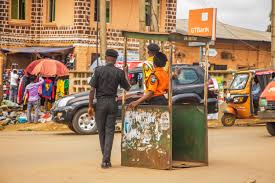Burned-out buildings and armed gangs in Lagos despite president's plea
Violence in Nigeria's sprawling commercial hub, a city of 20 million, has escalated since Tuesday night, when a round-the-clock curfew was announced. Amnesty International said soldiers and police killed at least 12 protesters in Lekki and Alausa, another Lagos district on Tuesday.

- Country:
- Nigeria
Gangs armed with knives and sticks blocked major roads in Lagos on Friday, with many on the streets angered by a speech in which the president appealed for calm but failed to condemn the killing of protesters demanding an end to police brutality. The unrest is the worst street violence since Nigeria's return to civilian rule in 1999 and the most serious political crisis confronting President Muhammadu Buhari, a former head of a military regime who came to power at the ballot box in 2015.
A highway leading to the international airport was obstructed by blockades manned by groups of young men demanding cash from motorists. Petrol stations were closed and cash machines were not working in parts of the city. Violence in Nigeria's sprawling commercial hub, a city of 20 million, has escalated since Tuesday night, when a round-the-clock curfew was announced.
Amnesty International said soldiers and police killed at least 12 protesters in Lekki and Alausa, another Lagos district on Tuesday. On Thursday, Amnesty, Human Rights Watch and 40 other groups called for an "immediate and thorough investigation" into the incident. A Nigerian DJ and musician known as DJ Switch, who broadcast the shooting live on Instagram, on Friday recounted the incident on the social media platform. She said the military carried out the shooting and she counted 15 dead bodies.
The army has denied soldiers were at the site of the Lekki shooting, where people had gathered in defiance of the curfew. Buhari, in a national address late on Thursday, urged youths to "discontinue the street protests and constructively engage government in finding solutions".
It was his first public address since the shootings began. Although he lamented the loss of innocent lives, he did not directly refer to the Lekki incident that sparked international condemnation. Many of those on the streets despite the curfew said Buhari's speech had angered them because of his failure to address the Lekki incident.
"We expected him to say something to condemn the killing," said businessman Lekan Shonibare. CURFEW
Lagos authorities have struggled to enforce the curfew imposed as anger over the killings rose. The state government on Friday said the restrictions would be eased from Saturday, with the curfew in place from 6 p.m. to 8 a.m. Tricycle rickshaw operator Victor Orji said any protests should be peaceful. "I am seeing what is happening, burning police stations, burning everywhere, that was not the right thing to do," he said.
Disruption has not been limited to Lagos. Several states in southern Nigeria have imposed curfews after two weeks of confrontations between security services and protesters. In addition to anger within Nigeria at the shooting of protesters, the incident has prompted a wave of international criticism of Nigerian authorities and the behaviour of the security forces.
A delegation of U.S. officials who were in Nigeria for previously scheduled meetings met the country's vice president on Thursday and condemned the "use of excessive force by military forces who fired on unarmed demonstrators in Lagos", a State Department spokeswoman said. Buhari, in his address, encouraged the international community to "know all facts available" before rushing to judgment.
(This story has not been edited by Devdiscourse staff and is auto-generated from a syndicated feed.)
- READ MORE ON:
- Buhari
- George
- Nigerian
- Muhammadu Buhari










